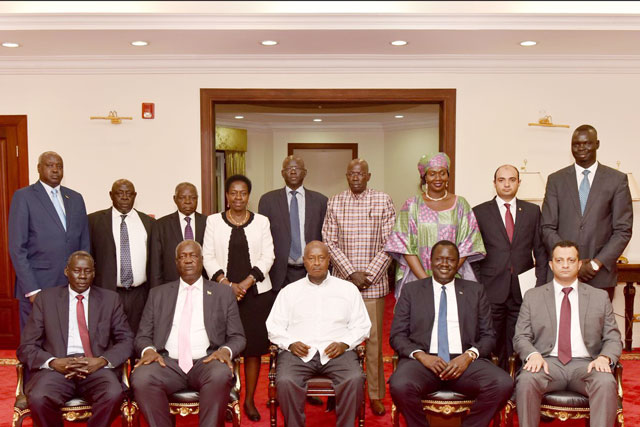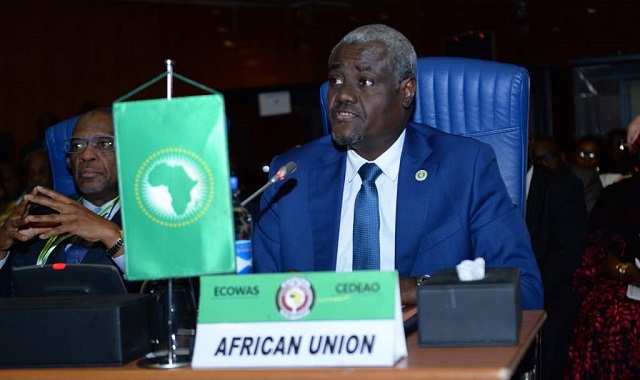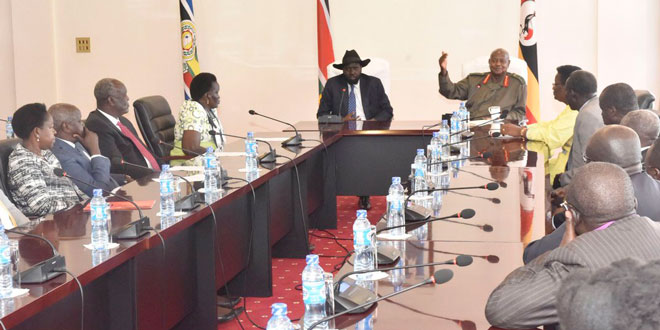
Addis Ababa, Ethiopia | AFP | South Sudan’s government and main armed groups on Thursday signed a ceasefire agreement during peace talks in Ethiopia, the latest push to end a devastating four year war in the country.
“With effect from 00:01 hours (South Sudan local time) on the 24th day of December 2017, a Cessation of Hostilities (CoH) shall come into force, and the parties shall cease all hostile military actions and operations,” read the agreement seen by AFP.
The agreement says all forces should “immediately freeze in their locations”, halt actions that could lead to confrontation and release political detainees as well as abducted women and children.
“This is an encouraging first step. You have given a ray of hope back to your people but it is only a small step. Now practical action is needed,” said African Union chairman Moussa Faki.
South Sudan’s leaders fought for decades for independence, but once they achieved it in 2011, a power struggle between President Salva Kiir and his former deputy Riek Machar led to all out civil war in 2013.
A peace deal was signed two years later but collapsed in July 2016 when fresh fighting in the capital Juba forced then first vice president Machar into exile.
The opposition split, with Taban Deng taking over as first-vice president, while Machar’s faction returned to battling the government in the bush.
While the initial fighting pitted Kiir’s ethnic Dinka against Machar’s Nuer, the renewed violence has metastasised with new opposition armed groups forming.
Violence spread to the southern region of Equatoria, forcing over a million South Sudanese to flock to neighbouring Uganda and the Democratic Republic of Congo in what has become the biggest refugee crisis on the continent.


The latest round of peace talks, which the United Nations described as a “last chance” for peace in the country was pushed by the regional IGAD group as a revitalisation of the 2015 deal.
However observers have highlighted that the shifts in the conflict since 2015 will mean taking into account new grievances.
In addition to Kiir’s government and Machar’s SPLA-IO, this round of peace talks also includes half a dozen armed opposition groups that have sprung up since July 2016.
– Thorny path to elections –
A permanent ceasefire is the first step in negotiations to include a “revised and realistic” timeline to holding elections.
The initial peace deal planned for elections in August 2018 — a date seen as unfeasible by many observers.
Numerous ceasefires have failed over the past years, with even the 2015 peace deal dogged by fighting.
A fresh government offensive that coincided with the peace talks only added to doubts over Kiir’s commitment to halting hostilities.
On Sunday, Kiir’s troops attacked the town of Lasu in Central Equatoria State, which has served as the headquarters for Machar’s SPLA-IO rebels, sending scores fleeing into the Democratic Republic of Congo (DRC).
“I’m not sure the government wants peace. If they wanted peace, why would they attack Lasu so that we have to run again with our children,” said Betty Moriba, a 28-year-old mother of five.
SPLA-IO spokesman Lam Paul Gabriel told AFP they planned to launch a counter-offensive even if the ceasefire agreement was signed, if the government did not withdraw voluntarily.
 The Independent Uganda: You get the Truth we Pay the Price
The Independent Uganda: You get the Truth we Pay the Price



Hmmm, we Africans never cease to amaze. For heavens sake why did South Sudan claim independence from the greater Sudan – knowing very well they could not stand on their own – in peace? As many of you might know, I am vehemently opposed against balkanisation of our continent – whether by others or by ourselves. If South Sudanese cannot live peacefully together under their own government, the more useful thing to do is for the more enlightened regional governments to work towards absorbing this so called ‘new country. In particular, the rest of the EAC leaderships should be working tirelessly to federate and then rescue our brothers, sisters, and natural resources in our north. Kenyatta recently took the vital step of opening the Kenyan gates to all East Africans. Museveni, Kagame, Magufuli – what are your new steps in this direction?